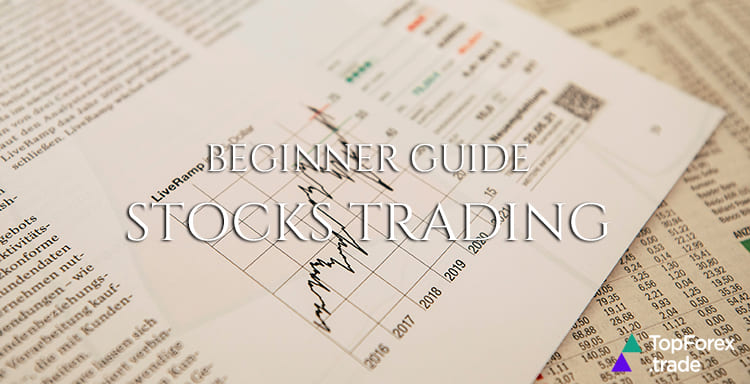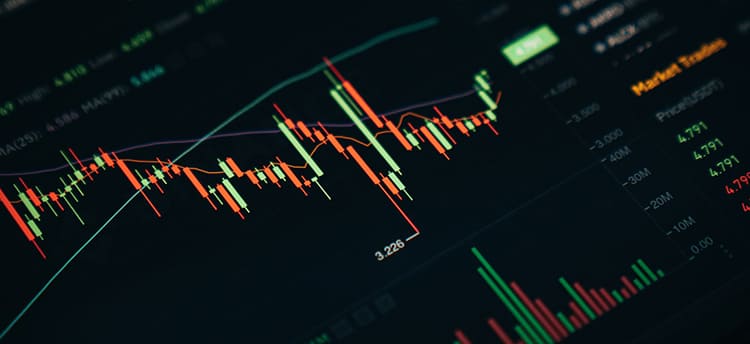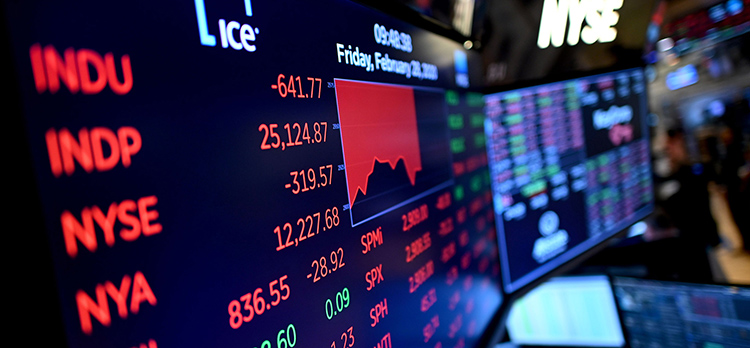Online stock investment and trading: basics you should know

For the casual observer, the stock market can be a perplexing place. Financial news is frequently riddled with puzzling terminology; stories from the stock exchange, stated value and retained earnings often mean nothing at all to market outsiders. Understanding and applying such concepts, however, is essential for those looking to trade stocks.
While trading stocks bears certain levels of risk that should be set off with a good risk management strategy, it can also be an effective way of accumulating wealth, and a well-chosen, the balanced stock portfolio has the potential to be a ticket to a steady passive income.
Retail and institutional investors and traders make deals in stocks on the stock exchange. Nowadays, the process is carried out electronically via major stock indices such as the Nasdaq 100, FTSE 100, and DAX, each representing the performance of a basket of certain stocks.
The market index tracks these stocks in order to calculate an index value based on weighted market capitalization. This means that a large movement in the price of a single large stock can have an impact on the index on which it is listed.
What is the difference between stocks and shares?
Stocks are essentially ownership certificates for a particular company. They are issued by a company to raise funds for expansion, and their value fluctuates based on the company’s performance. They can be publicly traded on the stock exchange or only available to private investors (OTC or over-the-counter stocks). Apple, Amazon, Tesla, Boeing, and Microsoft are among the most widely traded stocks, with the latter listed on the Nasdaq 100, Dow Jones, and S&P 500.
New product launches, the appointment of a new CEO, and earnings announcements are all examples of events that can move a stock’s price and influence a new trader’s stock choice.
Shares, on the other hand, denote proportional ownership of a particular company. For example, an investor with 150000 shares of a company with 1 million issued shares would have a 15% ownership stake.
How does the stock market affect the economy?

The relationship between the stock market and the economy can be broadly defined as funding fueling economic growth, enabling companies’ shares to increase personal wealth, and equities providing a measure of economic health.
Investment in the stock market can empower economic growth
The money that investors put into businesses, consequently, allows them to invest in economic growth as a whole. When a company first starts out, it may have to bootstrap or survive on a small amount of capital. However, when it offers shares to the public through an IPO, it has the opportunity to transform into a leading organization in its sector by hiring new employees, driving innovation, and achieving economies of scale. As a result, businesses can increase their revenues and gain a genuine competitive advantage in the marketplace, directly impacting GDP and boosting the economy.
Private companies’ impressive returns
While capital is at risk, investing in stocks and major stock indices is a potential way for individual investors – not just venture capitalists – to own successful businesses and accumulate wealth. This capital can then be re-invested or spent, thereby influencing the economy. Stocks have historically outperformed inflation in the long run, with some indices posting triple-digit returns since the turn of the century.
Stock markets gauge economic strength
The stock market is frequently regarded as a reliable economic barometer: it reveals how major corporations are performing, providing insight into economic health drivers like consumer spending.
Rising stock prices can indicate increased business and consumer confidence while falling stock prices do the opposite. If an index, such as the tech-centric Nasdaq, is on a bull run, it could indicate a variety of things, including investor confidence in electronics demand and faith in the financial strength of tech titans such as Microsoft and Apple, which have a larger impact on the index due to market cap weighting.
Any of these factors, and others, can cause the index to rise, and confidence can breed confidence. Yet, a disclaimer: an increase in stocks does not necessarily indicate that the overall economy is improving, and a decrease in stocks does not necessarily indicate that the overall economy is contracting.
How to choose the best stocks to invest in?

When it comes to picking the “best” stocks for their portfolio, market participants may benefit from sticking with companies they are already familiar with. Knowing a company’s background, current performance, and investors’ policy actually helps to determine the likelihood of its stock’s price rising – their ultimate goal as investors or traders.
Several factors that influence corporate stocks price volatility are listed below:
The financial health of the enterprise
What does the balance sheet of the company look like? Have its revenues and profits increased in recent years? What is a figure for total debt? If all these questions have satisfactory answers, then your portfolio is much less prone to rapid devaluation.
The technological advance of the company
What products are about to be launched? Are they in accordance with the latest market trends? Are there any business expansion plans? What is the customer satisfaction rate, and how is it compared to the industry competitors? The more innovative and customer friendly the company the more potential for it to gain in value.
Company’s investors’ policy
Amount of dividends you receive as an investor, how often they are paid and how it depends on changes in the company’s value.
Company’s market valuation
P/E ratio (price-to-earnings ratio) can be calculated by dividing a company’s current stock price by its earnings per share. Usually, this index’s figure below 15 is considered “cheap”. However, slow positive growth can also bring the value down. To get a more objective picture, calculate total assets on its balance sheet and deduct depreciation and liabilities.
Corporate liquidity
Liquidity refers to stocks with enough trading volume to allow traders to easily enter and exit positions, buying and selling them to other market participants.
History of stock price volatility
Volatility refers to the stocks that have the greatest potential for significant price movement. Investing in a volatile stock can be risky, but it can also provide lucrative opportunities.
What are the best stocks for intraday trading

Day traders employ different strategies to try to profit from short-term price changes in a given asset, choosing them by multiple criteria quite different from ones suitable for investing. Identifying the best stocks for intraday trading entails separating the current market trend from any external noise and then capitalizing on that trend.
Here are the main points you should think about picking the best stocks for your day trading:
Liquidity
The volume of liquid stocks is typically high, enabling larger quantities to be purchased and sold without having a significant impact on the price. As intraday trading strategies rely on speed and precision, a high level of volume makes it easier to enter and exit trades. Depth is also important because it indicates how much liquidity a stock has at different price levels above and below the current market bid and offer.
Medium to high volatility
To make money, day traders need price movements, so their goal is to select stocks that move a lot, either in dollars or percentages. Stocks that move 3% or more per day have large consistent intraday moves. The same can be said for stocks that move more than $1.50 per day.
Correlation with the market
While some traders specialize in contrarian plays, the majority of traders seek equities that move in lockstep with their sector and index group, meaning that when the index or market sector rises, the price of the individual stock rises as well. This is essential if the trader wishes to trade the strongest or weakest stocks on a daily basis. However, if you choose to trade the same stock every day, then just focus on that single stock with no concern about whether and how it is correlated with anything else.
Trading with leverage and margin
The opportunity to use the leverage provided by reliable Forex brokers can multiply your potential gains (as well as losses, so take your time to analyze the market). It allows you to open positions for assets that are worth more than your deposed capital, creating a corridor for price volatility. If the price changes within its boundaries, your profits are multiplied according to your leverage rate.
Strategies for Entry and Exit
You may have chosen the best stock in the world, but profiting from it will require specific strategies. They are numerous, so the key is to follow certain established guidelines. You can increase your chances of success by looking for specific intraday trading signals.
Identifying the best stocks for trading entails separating the current market trend from all the info-noise and to capitalize on that trend. The best intraday trading stocks have three characteristics: liquidity, volatility, and correlation. However, it is also critical to employ the proper entry and exit strategies.
Since day traders have limited time to profit, they should spend as little time as possible on trades that are moving in the wrong direction. Here are two simple guidelines for profit taking when trading with trends:
- Take profits in an uptrend or long position at/or slightly above the previous price high in the current trend;
- Take profits in a downtrend or short position at/or slightly below the previous price low in the current trend.
Main types of stocks

All stocks are classified, allowing traders to easily sift through, resulting in more efficient trading. Below are the major stock types most commonly used by stock traders:
Growth stocks
Ones that are solely for the purpose of capital growth. Companies will reinvest profits rather than pay dividends, so the only way for investors to profit is through capital gains. As a result, growth stocks are inherently risky: capital losses may occur, and the payoff from stocks expected to grow rapidly can make this risk worthwhile.
Dividend (yield) stocks
Dividend stocks have paid out regular (usually quarterly) dividends to shareholders. For example, if a company pays a dollar as an annual dividend per share, a quarterly dividend is 25 cents.
Defensive (non-cyclical) stocks
Issued by companies that have a consistently high demand for their products and services, regardless of the state of the economy; examples include healthcare, consumer goods, and utilities. As a result, they are ideal for analysing during recessions.
Safe stocks for beginner traders and investors

Safe haven stocks, also known as defensive or non-cyclical, are expected to hold or increase in value during periods of market turbulence, carrying lower risks in times of economic uncertainty.
Investors and traders seek this type of stock to limit their exposure to losses in the event of a market downturn. Stocks labeled as “safe havens” will, however, change over time as market conditions change.
Cyclical stocks are highly correlated with the current economic climate: their prices tend to fall when the market is in a slump/recession. Similarly, when the economy is doing well, these companies’ revenues tend to rise in tandem with their share prices (automobile and airline companies, for example).
Non-cyclical stocks are those that provide investors with a consistent return regardless of the state of the equity market, typically outperforming the market during recessions but underperforming during expansions. These safe haven stocks can be classified into three categories:
- Consumer goods
- Utilities
- Healthcare
Utilities like water, oil, and electricity are basic needs for consumers, making supply companies favored in a slowing economy. People prefer habitual consumer products as they tend to buy products they like in any scenario (hygiene, food, and drinks). Finally, healthcare is a constant regardless of financial, economic, or social circumstances.
Safe haven assets are not limited to the stock market only. Other financial markets, like Forex and commodities (especially gold), also can provide traders with protection against downturns.
Best Forex brokers for stocks trading and investment
As online stock trading can be a fascinating and rewarding experience, the volume of transactions in the market is increasing every day. To reduce potential losses and increase profits, it is important to master the fundamentals of trading, learn the specifics of Fundamental and Technical analysis, and have an executable strategy well practiced on trading demo accounts before stepping into the real stock market.
You don’t need a lot of capital to get into stock trading: the knowledge and reliability of your chosen broker are what count the most. Brokers recommended by TopForex.trade have been serving customers for decades and meet the high standards of the world’s most renowned financial authorities.
By using secure VPN services for online trading, you can open an account with these reputable brokers from almost any country. They have the best selection of stocks available, currency pairs, indices, commodities, and Cryptocurrencies as well as some of the best trading conditions, various Forex bonuses even on initial deposits (subject to geographic availability), Social trading (the feature that allows you to automatically duplicate the moves of professional traders), comprehensive educational materials for beginner traders, and latest financial news for relevant trading decisions.
Plus500 stocks CFDs trading
Number of the stocks available – 1000+ (CFDs)
Plus500 has been in the industry for more than a decade, offering CFDs on stocks, currency pairs, commodities, indices, and other financial instruments (over 2000 in total), as well as a trading guide and all the tools necessary to make trading more efficient and secure.
Plus500 customers can access a web terminal for PCs and laptops, as well as an Android and iOS mobile app. Accounts are classified into two types: real and demo. The second will provide an excellent opportunity for new brokers to practice, test their trading skills, and gain valuable knowledge in real-world market conditions while remaining completely risk-free.
Plus500 is a well-known Forex broker with licenses from the UK Financial Conduct Authority, the Australian Securities and Investments Commission, the Cyprus Securities and Exchange Commission, and the New Zealand Financial Markets Authority. It is also a Financial Sector Conduct Authority-licensed financial services provider in South Africa.
82% of retail investor accounts lose money when trading CFDs with this provider. You should consider whether you can afford to take the high risk of losing your money.
eToro stocks trading
Number of the stocks available – 2900+ (both real and CFDs)
eToro is one of the world’s most well-known brokerage firms (especially in Europe). Besides shares, you can trade currencies, commodities, indices, equities, and Cryptocurrencies, with the best available terms: minimal Forex trading costs and low initial deposits. New digital currencies such as Bitcoin, Ethereum, and others have been added to the list of trading instruments since 2017.
eToro has two account types: Retail Client and Professional Client. The first is protected from negative balance and has an eToro CopyTrader – Social trading feature, whereas the second has unlimited leverage. In addition, newcomers can always use a demo account to experiment with and try out new strategies.
eToro is a highly reputable broker with millions of clients worldwide, being licensed to operate in a number of countries and membership in the following regulatory bodies: FCA, ASIC, and CySEC.
AvaTrade stocks trading
Number of the stocks available – 1000+ (CFDs)
AvaTrade is a broker known for providing competitive rates on a diverse range of assets, including CFDs for stocks, currency pairs (both spot and futures), commodities, indices, and Cryptocurrencies. MT4, MT5, Proprietary, AvaTradeGo, AvaOptions, and WebTrader are among the trading platforms available. AvaTrade app for mobile trading is for you if you are a frequent trader who does not want to be tied to a computer.
AvaTrade provides a diverse range of automated trading platforms and tools that novice traders can use to increase the profitability of their trades. One of them is AvaSocial, Ava’s original Copy Trading feature that allows you to replicate the deals of successful traders you choose and benefit in the same way they do.
A strong regulatory framework can be added to the benefits of AvaTrade. MiFID, ASIC, the FSA and FFA, the FSB, IIROC, and the FSCA all have jurisdiction over it. AvaTrade has offices in almost every country and provides cross-continent regulatory coverage.
XM Group stocks trading
Number of the stocks available – 600+ (CFDs)
XM Group is a regulated online broker that provides over 1000 trading instruments on the MT4/MT5 platforms, including CFDs for Crypto (Bitcoin, Ethereum, Ripple), indices, commodities, metals, energy, and stocks (other 600 companies). In addition, the broker provides an easy-to-use mobile app that allows you to trade on global markets using a single login to a demo or live account.
Furthermore, XM offers a VPS service, allowing clients to fully enjoy all of the benefits of trading without having to worry about other issues that can impede fast and high-quality transactions, such as Internet connection speed, computer problems, and power outages.
One of the many benefits of XM Group is that there are no fees for deposits or withdrawals: the broker covers the entire cost of payment system commissions. Clients can select the most profitable trading account with negative balance protection, good leverage, and tight spreads from the following options: Micro, Standard, XM Ultra Low, and Shares.
Because of accreditation from recognized regulators such as CySEC, IFSC, DFSA, and ASIC, XG Group accepts clients from over 150 countries.
HF Markets stocks trading
Number of the stocks available – 2000+ (physical stocks)
HF Markets, formerly known as HotForex in some regions, is a broker with offices around the world that offers the most diverse range of trading instruments, including CFDs for over 1000 instruments such as currency pairs, commodities, Cryptocurrency, stocks, indices, metals, energies, bonds, and, most notably, Forex Gold trading with competitive low spreads and no hidden fees. Also, in 2022 HF Markets added over 2000 physical stocks to its trading instruments list.
HF Markets clients can choose between Micro, Premium, Zero Spread, Demo, and Islamic trading accounts. Original SocialTrading feature – HFcopy – allows you to mirror transactions from multiple traders at the same time.
All transactions take place across multiple platforms. Options include MT4, MetaTrader 4 Web Terminal, and mobile trading apps for Apple and iOS devices.
The broker is regulated by CySEC and the FCA in Europe, the FSCA in South Africa, and the DIFC in the Middle East (Dubai).
Stocks trading for beginners - FAQ